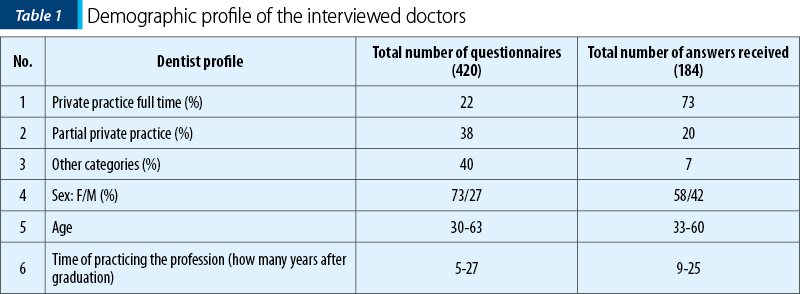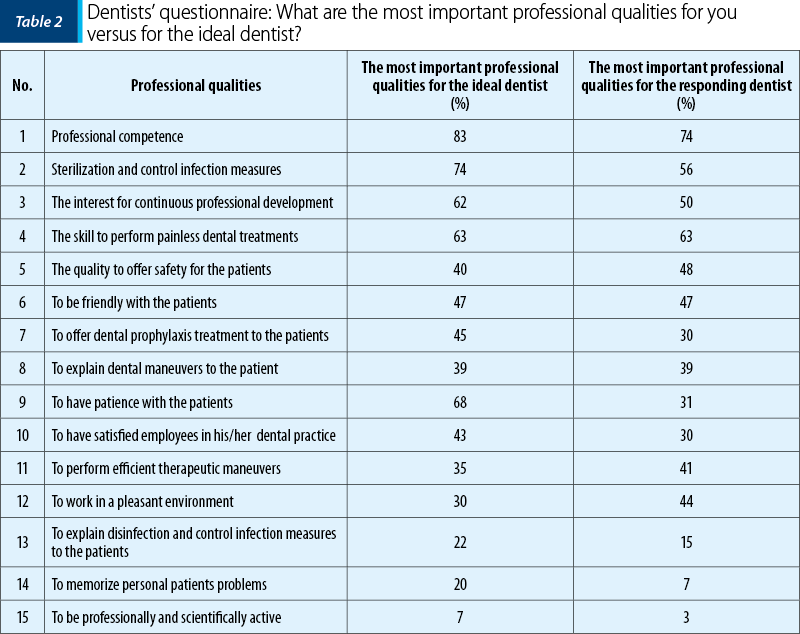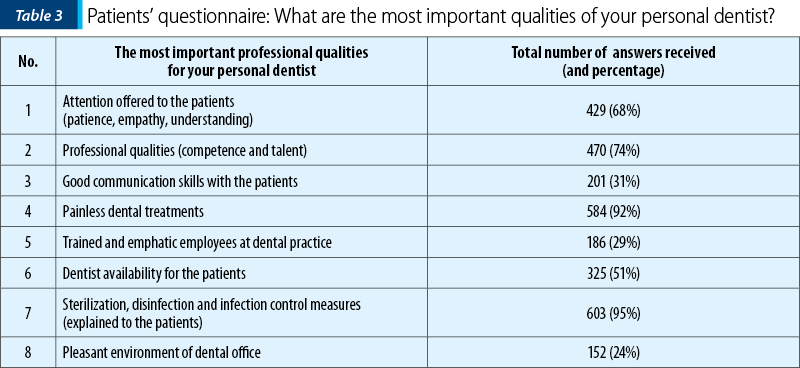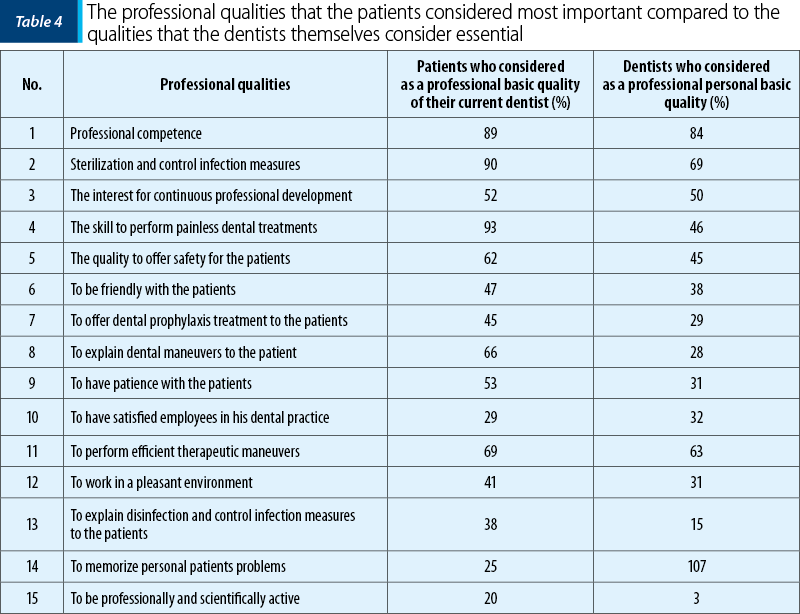The importance of dentist-patient relationship for a successful dental treatment
Importanţa relaţiei dintre medicul dentist şi pacient pentru un tratament stomatologic de succes
Abstract
This article presents a study on the importance of the relationship between the dentist and the patient, which affects the outcome of any dental treatment. The study involved dentists and patients who answered questions about the professional and psychological profile of the dentist. The results of the questionnaires revealed how important are both the attention given to the patient (patience, understanding, empathy), but also the compliance with the professional standards on infection control or the painless approach to dental treatments. The conclusions of the study offer us the possibility to improve the global image of the therapeutic act in dental medicine by the individual correction of each dentist where necessary.Keywords
dentist-patient relationshipprofessional qualitiesRezumat
În acest articol este prezentat un studiu privind importanţa relaţiei dintre medicul dentist şi pacient, care influenţează rezultatul oricărui tratament stomatologic. La studiu au participat atât medici dentişti, cât şi pacienţi, aceştia răspunzând la întrebări referitoare la profilul profesional şi psihologic al medicului dentist. Rezultatele chestionarelor relevă cât de importante sunt, pe de o parte, atenţia oferită pacientului (răbdare, înţelegere, empatie) şi, în egală măsură, respectarea standardelor profesionale privind controlul infecţiilor sau abordarea fără durere a unei manopere stomatologice. Concluziile studiului ne oferă posibilitatea de a îmbunătăţi imaginea globală a actului terapeutic de medicină dentară, prin corectarea individuală a fiecărui medic acolo unde este necesar.Cuvinte Cheie
relaţie dentist-pacientcalităţi profesionaleThis article presents a study on the importance of the relationship between the dentist and the patient, which affects the outcome of any dental treatment(1). The study involved a number of 184 dentists and 630 patients, who were questioned about the essential psychological and professional qualities a dentist must possess to be “a good doctor”.
The present study starts from the question: “What do patients think about the dental treatment?”, knowing that the profession of dentist was and still is identified with not a very good image, which even sometimes appears terrifying in books and movies. It is usually associated with pain and, thus, many adults and children are confronted with huge fear and anxiety when they have an appointment to a dental practice(2,3).
The motivation for choosing this topic begins from the fact that the doctor-patient relationship is the essence of a successful dental maneuver(4).
We took into account in our study not only the point of view of the patients, but also of the dentists themselves. This is because the way dentists look at and consider their profession is also critical. Our goal was to find the qualities of a dentist who, from the perspective of both sides, can and will improve the image of modern dentistry. Questionnaires were sent to a number of 420 dentists, of which 184 answered (43.8%). On the other hand, we also attached questionnaires for patients, which were offered to them at the end of the treatment session. All responses to questionnaires were anonymous, and the informed consent to participate in this study was obtain.
The questionnaires for doctors include qualities that we consider to be not only professional, but also psychological aspects, and that make their mark on the doctor-patient relationship. The answers we receive give us an image of how we look at dentists and how they consider themselves compared to an ideal image of the doctor.
We can easily notice that professional competence is the most important for a successful therapeutic approach, while it is surprising and worrying that the least appreciated is the scientific activity. This is concerning, because the two aspects are closely interconnected, especially nowadays, when the dental medicine is changing so quickly based on new technologies(5).
It is important to mention that the questionnaires sent were completed honestly, with a great sense of responsibility. As proof, the ideal dentist had higher scores in the vast majority of questions than those given by doctors themselves.


The second part of the study – the most important one – is represented by the questionnaires completed by the patients. The number of patients who completed the questionnaires was 630, meaning 39% from 1615 sent questionnaires.
What is certain and gratifying is that we have an extremely high percentage of patients who are satisfied with the dental treatments offered by their current doctor (87%) and, more than that, 98% of them stated that they intend to remain patients of the same dentist. Only 4% of patients said they were not satisfied with their dentists.
In our questionnaires, we asked patients to mention what they like most about their current dentist, the most important qualities they consider he possess and what exactly determined them to trust that doctor. Like the dentists themselves, the patients answered: professional competence (85%), as well as the application of disinfection, sterilization and all infection control measures (90%).
The total number of mentions is higher than the total number of patients who responded (630) because some of them gave more answers.
In the present study, we consider that it is essential and relevant to notice, confront and evaluate also the qualities that the doctor considers important for him and those that the patient appreciates. In this way, the aspects that lead to a successful treatment in dentistry can be improved.
For our dental therapeutic approach to be a success, we should consider and meditate about the responses received and summarized in Table 4.
First of all, we must take into account the expectations of our patients. We need to go beyond what we consider important for our professional careers. We must note the discrepancy between the percentage of patients and that of doctors (90/69) who pay paramount attention to the implementation of universal hygiene and infection control measures. The patients take into considerations general aspects such as: the cleanliness of the dental office, the existence of disposable, single use instruments, but they cannot control the degree of sterilization of the used dental instruments. Nevertheless, they will return to the dental office if they considered safe in terms of transmitting infections and they are satisfied with the dental works received.
Our study indicated that patients are satisfied with the dental treatments received, that they appreciate the competence and personal qualities of their dentist and, more than that, they consider their personal dentist superior to other doctors. It is very important to remember that it has been found that the personal dentist is twice as appreciated as dentists in general. It could be said here that we are faced with a paradox: the image of dentistry as a whole – as it is publicized and popularized – is so often a negative one, compared to the positive perception of each patient towards his dentist.
What exactly does the patient respect and admire about his doctor? The essential aspects for the doctor-patient relationship are: qualities of humanity such as gentleness, friendship, attention, but also professional competence(6-8). This kind of open attitude of the dentist towards his patients can help him in case any malpractice accusation may arise. The trust gained by the dentist will be an important aid to face any unpleasant situation and solve it. The dentist also must have an ethical attitude in his health practice and accept any medical liability when it is the case. His good relationship with the patients can help overcome these circumstances(9).
From our questionnaires we noticed that patients look at the dentist and the work performed by him in a more favorable way than the dentists themselves see. Moreover, the interviewed doctors do not consider themselves at the level of an ideal dentist; this supports the general idea that characterizes the dentist as a perfectionist; those who answered us are convinced that, even though they do their best, they can never reach the ideal status of dental practice.
In our study, the importance of a good communication between patient and doctor frequently appeared. We would like to emphasize this once again because among the most important qualities of a dentist are the desire to talk to the patient, to explain, to give information, patience and solicitude.


Conclusions
The main conclusion of this study is that patients are satisfied with their current personal dentists, who seem to fulfill the most appreciated professional qualities by their patients. We consider this important because a successful, harmonious relationship between the dentist and the patient makes possible a proper care of the general state of health and in particular of the orodental area. As a result, we can improve the overall image of the dental medicine, continuing to offer to every patient a competent treatment, an open, clear and objective communication with him, as well as all our attention and involvement while performing dental maneuvers.
Acknowledgements. All the authors have equal contributions for this article.
Conflicts of interests: The authors declare no conflict of interests.
Bibliografie
- FDI World Dental Federation. FDI policy statement on Partnering for better health – The dentist-patient relationship: Adopted by the General Assembly: September 2016, Poznan, Poland. Int Dent J. Feb 2017;67(1):8-9.
- Smith AJE. Series: Communication in the dental practice. Building a good dentist-patient relationship with communication. Ned Tijdschr Tandheelkd. Jan 2019;126(1):37-44.
- Morgan AG, Rodd HD, Porritt JM, Baker SR, Creswell C, Newton T, Williams C, Marshman Z. Children’s experiences of dental anxiety. Int J Paediatr Dent. 2017 Mar;27(2):87-97.
- Yamalik N. Dentist-patient relationship and quality care 1. Introduction Int Dent J. Apr 2005;55(2):110-2.
- Wolf TG, Campus G. Changing Dental Profession-Modern Forms and Challenges in Dental Practice. Changing Dental Profession – Modern Forms and Challenges in Dental Practice. Int J Environ Res Public Health. 2021 Feb 17;18(4):1945.
- Jones LM, Huggins TJ. Empathy in the dentist-patient relationship: review and application. N Z Dent J. 2014 Sep;110(3):98-104.
- Chandu A. Communication and dentistry – an important part of the dentist-patient relationship. Aust Dent J. Jun 2011;56(2):240-1.
- Spyropoulos MN. Communication between doctor and patient in contemporary times. Am J Orthod Dentofacial Orthop. 2017 Apr;151(4):629-632.
- Nicola G, Gheorghiu IM, Scărlătescu S, Constantinescu FE, Perlea P. Managing the relationship with the press in the context of medical malpractice accusation. Rom J Leg Med. 2020;28:348-354.


